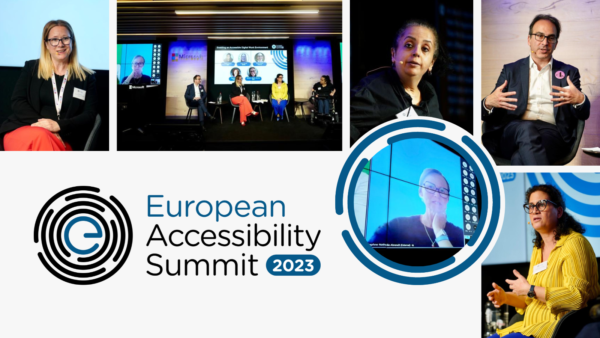Why is it so important to create an inclusive digital work environment for workers with disabilities? Why should we promote basic digital skills for all? How do digital changes in our economy and society impact persons with disabilities? These are some of the many questions participants from the European Accessibility Summit reflected on during the panel “Enabling an accessible digital work environment”.
Acquiring and developing digital skills
The moderator of the panel, Nadia Hadad, Executive Committee member of the European Disability Forum (EDF), highlighted how persons with disabilities can benefit significantly from learning digital skills, both for improving job prospects and opening up opportunities for social inclusion. She added that:
Persons with disabilities experience many challenges to digital inclusion and still face barriers in their everyday lives such as lack of opportunity to acquire basic digital skills, lack of motivation to engage with technology and lack of employment opportunities. 2023 is the European Year of Skills and is an opportunity to support the inclusion of persons with disabilities in the labour market and society.
Daphne Nathalie Ahrendt, Senior Research Manager, Eurofound, highlighted their work on monitoring three Mega drivers that are impacting the significant changes to the labour market at the moment: the demographic, climate and technological changes. Each of these changes has a real impact, also on activities for people with disabilities. She explained that:
We have to make sure that the workplace enables people with disabilities to participate, come to work and to be part of the workforce. As we transition to a greener economy, we have to make sure that no one is left behind. For example, it’s clear how Artificial Intelligence (AI) is going to feature in all of our work but it’s about making sure that access to that technology is equal, affordable and the skills are there for people to use them.

Accompanying job seekers in their digital skills development
Bárbara Martín Muñoz, Vice President, European Blind Union (EBU) presented two different manuals created for young blind and partially sighted job seekers: the Manual “ADVISE – AiDing Visually Impaired Seeking Employment” and the Manual for inexperienced job seekers with a visual impairment. They contain general information about best practices when applying for a job, how to build an effective Curriculum Vitae (CV), and how and when to communicate about their disability. She said:
The transition period to find a job and to get the job is hard enough: you are not prepared to get a job and you don’t know how to get a job. We have to learn how to do it and adapt to the digital world and gain digital skills that not everybody has. Accessibility and reasonable accommodation remain the main challenges for persons with disabilities in accessing the tools in the work environment. Having accessibility and accommodations in place means that we can access, and maintain the job and furthermore, we can make a professional career.
The role of employers and educational programs in making jobs accessible
Bruce Roch, Global Head of Inclusion, The Adecco Group highlighted the importance of engaging employers, reassuring people about their future careers, and allowing them to grow their skills portfolio. He added:
It’s about reassuring individuals and the employers. When you’re an HR intermediary dealing with recruitment in the labour market, you are obliged to think in a broad way. Think out of the box with the existing tools and when possible, you can develop further levers. For us, accessibility is on the frame. All recruiters are given an accessibility guideline when it comes to digital skills. It starts with the interview. It starts with the CV. It starts with the registration on the website. It’s about being welcomed and mainstream inclusion.
Laura Davis, Chief Executive, BASE – British Association of Supported Employers highlighted the importance of the education programmes and explained some of the best practices promoted in the United Kingdom (UK):
The supported internship program is a study model to help young people with disabilities develop their work skills and move into or towards a paid job. The wonderful thing about the model is that 70% of young people get paid. This isn’t just about skills. It’s about what strengths people need to develop and how they articulate evidence of those strengths in order to support them to enter into the labour market. From the employers, there is not a lack of interest or ambition. Most of them intellectually understand why is important to hire people with disabilities. But when you get down to the how, that’s where they just don’t know.
Further explore the topic
If you missed the European Accessibility Summit 2023 and the session on “Enabling an accessible digital work environment”, you can watch the recording of the event.
About the European Accessibility Summit 2023
The 2023 edition of the European Accessibility Summit was organised by the European Disability Forum and supported by Microsoft.
You can find more info on the agenda, speakers and recordings on the event page.